- Home
- Richard Adams
The Plague Dogs: A Novel Page 4
The Plague Dogs: A Novel Read online
Page 4
“Rowf! Rowf, come back! The tobacco man’s left my head open! Let me explain—”
The next moment he was knocked flying as Rowf bounded out of the kennel and leapt towards the pen door. His jaws snapped at the wire, biting and worrying, and the catch which Tyson, when interrupted by his friend, had omitted to fasten properly, clicked open off the jamb. After a few moments Rowf fell back, blinking and staring like a dog awakened from a bad dream.
“What?” said Rowf. “The tobacco man? Not the whitecoats—it can’t be the whitecoats—it’s still dark, isn’t it? It’s not time for the tank yet! I’ll fight—I’ll tear them—” He stopped and looked at Snitter in surprise. “What are you doing here, Snitter?”
“Heave-ho, the loose wire. You know, there was an old lady two gardens away who had a trap-hole made for her cats at night. In and out they went, in and out; but if ever they came into my garden, what-ho!”
“You’re bleeding!”
“Rowf, the moonlight, the door, I’ve come to tell you, it’s come loose on my head. The tobacco man forgot that it’s not. How can I explain? The door’s not a wall any more! Oh, my head aches!” Snitter sat on his haunches and began scratching and grabbing with one paw at the canvas cap, which remained, as it was intended to, resistant to his claws. In the moonlight Rowf looked at him grimly, but said nothing.
“My head!” muttered Snitter. “The tobacco man lit it with his matches. Can you smell it burning?”
“When did he?”
“I was asleep. The whitecoats put me on a glass table and I went to sleep. How the flies go round today! It’s so hot, even in the garden. I think I’ll go to sleep. If the lorry comes, Rowf—” He yawned and lay down on the floor.
Rowf got up and began to sniff at Snitter and lick his face. The effect was apparently something like that of smelling salts, the odour of his friend recalling Snitter to reality.
“The wire swing!” said Snitter, sitting up suddenly. “The door, Rowf! That’s why I came! The door of your pen’s unfastened!”
The Alsatian had stopped howling and for some moments the only sound in the block was a sudden dripping from the tap, plangent on the convex edge of the overturned bucket beneath it.
“We can go through it, Rowf!”
“What for?”
“Rowf, we might be able to get out of here!”
“They’d only bring us back. Dogs are supposed to do what men want—I’ve never had a master, but I know that.”
“The suffering, Rowf, the misery you’ve endured—”
“As dogs we’re born to suffering. It’s a bad world for animals—”
“Rowf, you owe them nothing—nothing—they’re not masters—”
“Canine nature—the whole duty of Dog—”
“Oh shit in the sky, give me patience!” cried Snitter in agony. “There’s a dog with a red-hot nose sniffing me over! The lorry’s coming, the lorry’s coming!” He staggered, and fell on the straw, but picked himself up at once. “Rowf, we’re going to escape! Both of us—through that door—”
“There might be something worse through the door,” said Rowf, peering into the dismal confines of the concrete huis clos surrounding them.
Snitter’s jaws worked convulsively as with an effort he converted and brought his mutilated mind in frame.
“Rowf, the water—the metal water! What could be worse than the metal water? Hours and hours of struggling in the metal water, Rowf, and in the end they’ll drown you! Think of the whitecoats, Rowf—what you told me—peering down into the tank and watching you. They aren’t masters, believe me; I’ve had a master—I know. If we could only get out of here we might find a master—who can tell?—a proper pack leader. Isn’t it worth a try?”
Rowf stood tense and hesitant in the straw. Suddenly, from somewhere up the fell outside, there came the faintest sound of rocky splashing as a yow, or Lakeland sheep, scrambled its way across a beck. Rowf gave a short, snapping bark and pushed his way through the door. Snitter followed and together, in silence save for their clicking claws, they trotted quickly down the line of pens to the swing doors separating the canine shed from the next.
It took Snitter some time to get the hang of the doors. They were light; indeed, they were portable, constructed of thick asbestos sheets on white-painted wooden frames, for Lord Plynlimmon had thought fit, when designing the block, to provide for flexibility in the subdivisioning by enabling the various sheds to be made larger or smaller at need; and accordingly not only the doors but also the pre-constructed modules of the party walls were capable (with a little trouble) of being removed and re-fixed further up or down the building, to increase or diminish the various floor areas. The doors, however, were fitted with fairly strong return springs, of the kind that cause such doors to jump back and hit smartly on the knee or in the face a man following another who is not particularly heedful or considerate.
Rowf hurled himself at the right-hand door, which swung open about six inches and then, the spring coming into its own, threw him back across the concrete floor. Growling, he went for it again, harder this time and higher up. Once more it gave and, as he dropped to the ground with his head through the narrow opening, closed upon his neck like a trap, pinning him between the two forward edges. He struggled back in silence and was about to try to seize the frame in his teeth when Snitter stopped him.
“It’s not alive, Rowf! It’s—it’s—you scratch it to be let in; but there isn’t a man on the other side, you see—”
“There’s some creature on the other side pushing it back! We’ll have to kill it—or chase it away, anyhow—but I can’t get at it.”
“Wait, wait. Let’s have a smell round.”
Snitter pressed his wet nose to the narrow, vertical chink between the two doors. The draught coming through bore smells, certainly, but nothing more alarming than birds’ droppings, feathers, grain and bran—all strong and at close quarters. He could hear, too, no more than a few yards away, the rustling and soft movements of roosting birds.
“Unless it’s a creature that has no smell, Rowf, there’s nothing but birds in there.”
A sudden, high-pitched yapping sounded from behind them. Snitter turned to see the occupant of the nearest pen, a cross-bred Pekinese, standing wide awake in a patch of moonlight and looking at them with obvious surprise. He went quickly across to the wire.
“Don’t make a row, Flatface,” he said. “You might bring the tobacco man back here.”
“What are you doing?” asked the Pekinese, nose pressed against the wire. “Why are you loose? What’s that on your head? It smells of that stuff the whitecoats put over everything.”
“It’s to keep the frost out,” answered Snitter. “My head’s a bird-table, you know. The whitecoats cover it with bread every morning and then watch while the birds come and eat it.”
“Oh, I see.” The Pekinese looked sagacious. “But how do they keep you still?”
“With chicken-wire,” said Snitter. “I dote on it, actually. My friend here dotes on it, too. He takes over when I need a rest. We’re both bird-tables through and through. Do the whitecoats go through and through? Those doors there, I mean? How do they do it?”
The Pekinese was clearly puzzled. “They made me better,” he said. “First they made me ill and then they made me better. I’ve been ill, you know.”
“I can smell that,” said Snitter. “You smell like a dog-blanket left out in the rain. Flatface, listen—does the tobacco man ever go through that door?”
“Yes, to feed the birds. It’s all birds in there. You can smell them. Besides, I’ve seen through when he opens it.”
“Through and through,” said Snitter. “How does he do it?”
“He’s usually carrying things, and he pushes it with his shoulder or his foot and then edges through sideways. Let me tell you what happened when I was ill. First of all the whitecoats—”
Snitter went back to the doors and pressed the wedge of his muzzle gently into the central
crack. The right-hand door, which had the weaker spring, gave slightly, and he slowly pushed through first his jaw and then his whole head, accustoming himself to the sensation of the counter-pressure. As soon as his head was through he turned his body sideways and began to press with the weight of his flank against the flat of the door.
“Follow me right up close, old Rowf. There’s a board loose in the fence, do you see? Don’t jump at it, just push. Why, what a cloud of flies—no, it’s birds—birds!”
He eased his entire body through the door. Rowf followed him, nose to tail, and the swing doors closed behind them, cutting off the familiar smells of dog, straw and meat and exposing them, with all the suddenness of an airliner from the north discharging passengers in the tropics, to the immediate impact of strange light, strange air and strange surroundings.
The place was full of birds. They could smell, all about them, the light, sharp odour of their droppings and hear, too, the sounds, so much quicker and softer than those made by dogs, of their stirrings in the dark. A pigeon nearby preened a wing, uttered a single, sleepy “Roo-too-roo; took!” and was silent. There must be many, many birds. Pausing and listening, both dogs had the impression of a forest in which the leaves were pigeons, spray upon spray, rustling leaves receding into an airy gloom. Here and there a wiry branch creaked; here and there a fragment from a seed-trough pattered, like a fir-cone or a beech-nut, to the floor.
They had entered the pigeon aviary, reservoir of one of the more eagerly watched, important and ambitious projects in which Animal Research was engaged. The object was nothing less than to discover how and by what means pigeons exercise their homing instinct—a Promethean undertaking indeed, since the birds themselves have always been content with ignorance in the matter. The thoroughness of the experiments, devised and conducted by Mr. Lubbock, a colleague and friend of Dr. Boycott, was impressive. Here, systematically divided into groups and caged in different compartments, lived hundreds of birds, each a grain of coral in that great reef of conscious knowledge to be built by Mr. Lubbock for the good, or the advancement, or the edification—or something or other, anyway—of the human race. Of those birds which had already been released to flight at greater or lesser distances from the station, some had had one eye or both eyes occluded by special appliances; some had been fitted with minute contact lenses, to distort their vision; others had had the sensitivity of feathers, feet, nostrils, beaks, mouths or lungs impaired or destroyed before setting out; others again had undergone carefully planned conditioning designed to confuse them when exposed to normal weather conditions. In Cage 19 it rained a continuous light drizzle twenty-four hours a day. In Cage 3, which was blacked out from the rest of the aviary, there was perpetual sunshine; in Cage 11, perpetual darkness., In Cage 8 the source of light (a simulated sun) moved anti-clockwise. Cage 21 was unusually hot, Cage 16A (so termed to differentiate it, for the avoidance of possible confusion, from Cage 16, in which all the inmates had died of cold one night, necessitating total replacement) unusually cold. In Cage 32 a light wind blew from one direction night and day. Birds born in these cages had never known any other weather conditions until their time came to be released to a homing flight. Cage 9 contained a special ceiling which reproduced the night sky, but with the various constellations disordered. At the far end of the aviary was a row of individual cages, containing birds into whose heads had been grafted magnetic particles, some attractive, others repellent. Finally, there were those pigeons who had been deafened, but left with other faculties intact.
The results of all the experiments so far had been most informative, yielding the basic information that while some of the birds succeeded in returning home, others did not. Many, in fact, in obedience to their defective stimuli, had flown straight out to sea until they perished; which was most interesting. One could draw the firm and valuable conclusions first, that birds whose faculties had been impaired were less swift and competent in getting home than birds whose faculties had not; and secondly, that in any given group, some succeeded in returning while others, who did not, presumably died. Six months ago Mr. Lubbock had taken part in a television programme on the project, when he had explained the pattern of the experiments and the system by which various possibilities were being eliminated. Since then, important evidence had been obtained in support of the theory that the birds possessed an instinct not really explicable in scientific terms. This was humorously known at Lawson Park as the “R.N.K.” theory, from a remark once made by Tyson to Mr. Lubbock—”Reckon nobody knaws.”
Snitter and Rowf made their way cautiously forward between the cages, half-expecting to meet some kind of enemy in this strange place. Or perhaps one of the whitecoats, with brisk walk and purposeful tapping of heels, might suddenly open a door and, pausing just inside in the way they did, raise his soap-smelling hand to the wall in the gesture that created light. All remained quiet, however, and they pattered on, side by side, to the further end of the aviary. Here they were once more met by double doors leading into the next block. Snitter eased his way through and Rowf followed as before.
At once, though in a place similar in form to the last and constructed of the same materials, they encountered another change, arresting as that, to humans, of red limelight to green. All was the same, all was utterly different. An intense, slavering excitement shot through them. They stiffened, sniffed the air, whined, scratched and trembled. Rowf leapt forward with two quick barks. The place was crowded with rats, rats scuttling and crouching in innumerable cages. There were dead rats, too—that was plain to be smelt; and some strange kind of rat, the smell of which seemed to come from one quarter in particular—a gritty, black smell. Filtering through all, posseting and curding the thin and wholesome odour of rats, was a vile and loathsome redolence, as of pestilence or death, so that Rowf, even as he barked about, was struck by an instant tetter of horror, and slunk back silently to where Snitter, with head uplifted and ears cocked, was standing on the shadowy floor beneath a steel table.
They were in the cancer research block, where rats, after being infected with cancer, were treated with various palliative drugs and preparations, being dissected after death so that the results of treatment could be observed and noted. There were in actual fact sixty-two separate cages, not counting the single large cage containing the control pool or reserve, from which healthy rats were taken as required for one experiment or another. Here were cancers of the ear, nose, throat, belly and bowels; malignant and less malignant cancers, sarcomata of many kinds, all living and growing, like submarine anemones, in pharyngeal, uterine or abdominal worlds of silence needing neither sun nor rain. Secret was the garden, set in the pathless awe now confronting the two bewildered dogs. The rats ran in, the rats ran out and never a rat to be seen, save for those stiff bodies lying on the glass table, the crop of the previous day’s work, neatly split across from end to end to disclose, like walnuts, the white, ridged and crinkled, kernel-like growths within.
In one corner of the block, like a private ward in a hospital, stood a separate compartment with a locked door bearing the notice, DR. W. GOODNER. KEEP OUT. AUTHORISED PERSONNEL ONLY. This, too, contained rats—black rats of Norway—despite the fact that they were not personnel, this term being generally understood at Lawson Park (and indeed elsewhere) to connote only men and women (as in the Rights of Personnel, or the Prayer for All Sorts and Conditions of Personnel, or even
All Personnel
That on earth do dwell
Sing to the Lord with cheerful voice).
The exact nature of the project being pursued in this locked compartment was secret. Dr. Goodner never discussed it with anyone but the Director; others at the station, however (including Mr. Powell), had hazarded the surmise that it had probably, like most such work, been commissioned by the Ministry of Defence.
Rowf paused at the locked door, sniffing at the crack beneath and listening.
“What’s the matter with this place? What is that smell?”
“The
leaves are rotten,” whispered Snitter. For some reason the smell made him afraid. “They fall in autumn, you know—fill the gutters. Maggots and flies, maggots and flies. Are you hungry?”
“Not yet.”
“Then come on. We’re trying to get out, Rowf. Even if we were to get in there and eat that smell, we’d be all whistle-belly-vengeance by sunrise, and the tobacco man would find us lying here sick, or worse. There’s some terrible sort of disease in there—that’s what that smell’s about. Come on, quick, before there’s time to change your nose.”
With this Snitter turned, led the way down to the further end of the block and once more pushed through the doors.
Later, the wanderings of that night merged, for both of them, into a half-remembered confusion of formaldehyde and surgical spirit, fur, feather and hair; of paint, glass and disinfectant, hay, straw and cotton-wool; of all manner of excreta and glandular secretions; carbolic and rust, dried blood and wet mucus, dust, drains and sweat; quick, low alarm calls of beasts unknown and windy suspiration of forced breath in darkness. They came to the next block, the sparrow and finch aviary, where diseases of cage-birds were investigated, together with the effect of various preparations used for dressing seed-corn before sowing. These particular sparrows had cost rather more than two farthings for five, certainly in overheads if not in purchasing price. There was a special providence in their fall; but whether they fell to the ground with or without your heavenly Father, or mine, or Dr. Boycott’s (for he had, albeit unacknowledged, the same One as you and I), there is no telling.

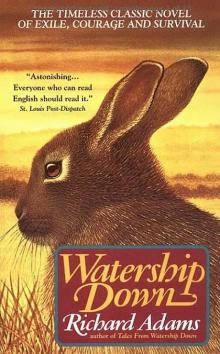 Watership Down
Watership Down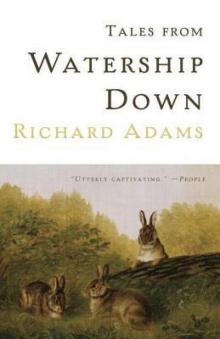 Tales From Watership Down
Tales From Watership Down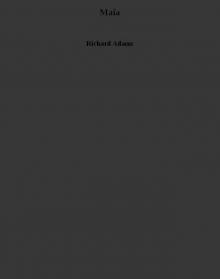 Maia
Maia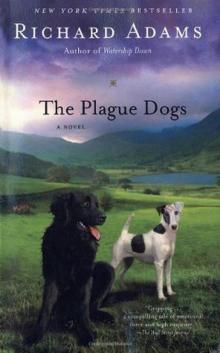 The Plague Dogs
The Plague Dogs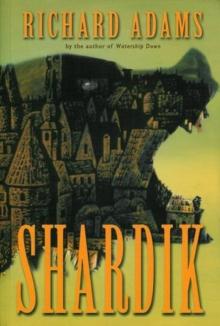 Shardik
Shardik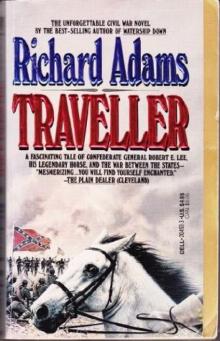 Traveller
Traveller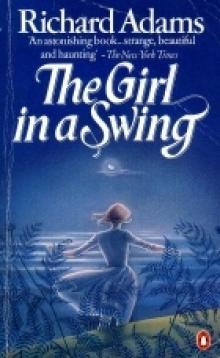 The Girl in a Swing
The Girl in a Swing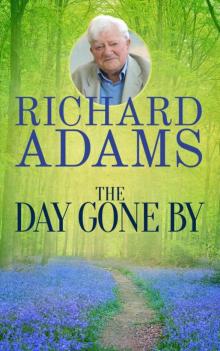 The Day Gone By
The Day Gone By Daniel
Daniel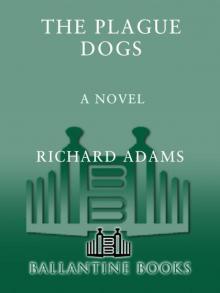 The Plague Dogs: A Novel
The Plague Dogs: A Novel